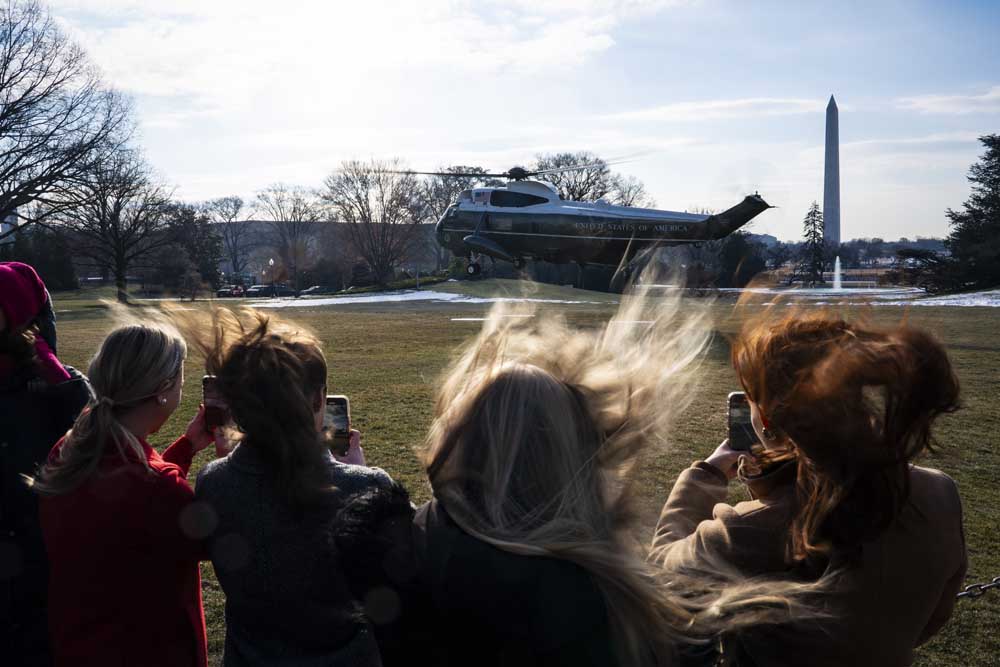Guest editorial: Why government needs inspectors general
Published 12:15 am Thursday, January 30, 2025

- The Marine One helicopter carrying President Donald J Trump and first lady Melania Trump departs from the South Lawn of the White House on Friday in Washington, DC.
Sen. Joni Ernst launched a new Inspector General Caucus on Jan. 15, with the laudable goal of empowering watchdogs across the executive branch as they identify waste, fraud and abuse. She said the inspectors general “supplied key details” in creating her road map for the “Department of Government Efficiency” and in gathering information on how few federal employees come into the office. “Their work has been invaluable,” she said. Her fellow Iowa Republican, Sen. Chuck Grassley, added: “I rely heavily on these independent watchdogs when carrying out my constitutional responsibility of oversight.”
Nine days later, President Donald Trump fired at least 15 inspectors general in a Friday night purge. Sadly, the response from congressional Republicans has been muted. Ernst’s office said late Monday that the senator “looks forward to learning more about this decision and working with the president to nominate replacements, so the important work … can continue with full transparency.” Grassley said that “there may be a good reason the IGs were fired.”
Their early unwillingness to challenge Trump suggests that the GOP majorities in both chambers do not plan to exercise rigorous oversight of the executive branch. This instance is especially troubling. Trump is violating a 2022 law that passed with strong bipartisan support to protect the IGs’ independence. The law was a rare structural reform enacted during Trump’s four years out of power that codified a norm he had trampled during his first term. (Another one was the revision of the Electoral Count Act to avert a repeat of Jan. 6, 2021.)
The original 1978 Inspector General Act was part of the post-Watergate reform movement. It created independent IGs in each Cabinet department to conduct investigations and audits of spending and operations. The bipartisan backlash when Ronald Reagan ousted 15 of them after becoming president in 1981 dissuaded future presidents from replacing any without a good cause.
This norm endured until Trump dismissed five IGs in rapid succession amid the coronavirus pandemic in the spring of 2020. He fired the intelligence community’s IG after he forwarded, as required by law, a CIA whistleblower complaint to Congress that led to Trump’s first impeachment. The president retaliated against the acting IG at the Department of Health and Human Services after she released a report about shortages of personal protective equipment at hospitals. He removed the State Department’s IG as he investigated then-Secretary of State Mike Pompeo for using government employees to run personal errands.
These abuses inspired the 2022 reforms. The first requires the president to provide Congress, with 30 days’ notice, a “substantive rationale, including detailed and case-specific reasons” for removing an inspector general. No such notice was given in this case. The second major change limits the possible candidates a president can install as acting IG once they’ve removed the person confirmed by the Senate. The goal here is to ensure that someone already in an IG’s office will step in, rather than a political appointee. Ideally, this provision will limit the damage from Trump’s firings this time.
One irony is that Trump is trying to get rid of several people he himself seated five years ago, many of whom were quite critical of President Joe Biden’s administration. Michael Missal, the inspector general at Veterans Affairs, exposed the Biden White House’s botched rollout of electronic medical records and six-figure bonuses for department executives. Earlier this month, the ousted Pentagon inspector general released a scathing report that faulted former defense secretary Lloyd Austin for the secrecy around his 2024 hospitalization.
Trump fired both of them, as well as the IGs for Treasury, State, Transportation, Labor, Housing and Urban Development, Health and Human Services, Interior, Energy, Commerce and Agriculture, and those at the Environmental Protection Agency, the Small Business Administration and the Social Security Administration.
To his credit, he spared Justice Department Inspector General Michael Horowitz, who has done excellent work on problems in places such as the Bureau of Prisons and on the FBI’s failure to better prepare for the 2021 Capitol riot. Trump told reporters on Saturday that he appreciated Horowitz’s 2018 report on the FBI’s handling of its investigation into the first Trump campaign.
The people Trump fired have produced valuable work, and getting rid of them risks politicizing their roles. During his four years, Biden fired only one inspector general, the one working at the U.S. Railroad Retirement Board — after an investigation concluded that he had created a hostile work environment.
To show he cares about good government and increasing efficiency, Trump should revisit his plan to purge the IGs. If not, then he should at least move swiftly to nominate serious-minded replacements whose investigations will carry credibility. And the Senate should scrutinize these nominees to ensure they are independent. Lawmakers in both parties should also make sure they fulfill their constitutional obligation to provide a check on the executive branch.






